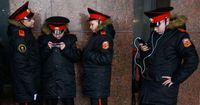In Russia, a significant development has occurred with the full launch of the Unified Register of Military Registration, known as Reestrpovestok.rf, which has transitioned from test mode to full operation. This new system, as reported by the human rights project "Idite Lesom," is now accessible to all users, allowing them to log into personal accounts, check their military summons, and request extracts from the register. Previously, the website indicated that it was only operational in three regions: the Ryazan region, Mari El, and Sakhalin, but this information has now been removed.
Despite the lack of an official announcement regarding the launch, the platform’s full functionality was anticipated since the autumn of last year. However, the rollout was delayed, ultimately starting in early 2025. According to the law, a summons is automatically considered served seven days after it appears in the register. If individuals fail to report to the military enlistment office within 20 days, they may face restrictions that could prevent them from traveling abroad, registering property and vehicles, obtaining a foreign passport, or securing loans.
As the number of conscripts in Russia continues to rise, the spring conscription campaign began on April 1, 2025, with a presidential decree anticipating the drafting of 160,000 individuals by July 15. This marks an increase from last year’s figure of 150,000 and 147,000 in 2023. Since the onset of the war with Ukraine, the regular strength of the Russian army has surged from around one million to one and a half million personnel. Additionally, the upper age limit for conscription was raised from 27 to 30 years, while the lower limit remains unchanged at 18 years.
In a related context, on the eve of Victory Day, President Vladimir Putin announced a truce from May 8, 2025, for 72 hours. However, Ukrainian President Vladimir Zelensky promptly rejected this proposal, asserting that such a ceasefire was merely intended to facilitate a parade in Moscow.
On the night of May 7, Ukraine executed its most extensive drone attack on Russian territory to date, with reports indicating the destruction of 524 Ukrainian drones within a single day. This attack affected several regions, including Moscow, Tula, Kaluga, and Mordovia, leading to significant disruptions in mobile communications across more than 30 regions and causing chaos at airports. The Association of Tour Operators of Russia (ATOR) reported that this incident impacted at least 350 flights and around 60,000 passengers, prompting Turkish Airlines to cancel all flights to Russia.
As foreign leaders, including Chinese President Xi Jinping, Serbian President Aleksandar Vucic, and Brazilian President Lula da Silva, arrived in Moscow for the celebrations, the city was put under unprecedented restrictions. The mayor’s office announced that due to the influx of high-level foreign delegations, there would be limitations on transport movement and mobile internet access, resulting in a significant shutdown of services.
Businesses across Moscow faced operational paralysis, with ATMs, online banking, and taxi services experiencing intermittent functionality. Cyber lawyer Sarkis Darbinyan explained that the authorities aimed to counter potential drone operations, which often utilize Russian SIM cards, by jamming mobile internet to complicate coordination.
The restrictions extended to all restaurants, cafes, and shops along the military parade route, including Novy Arbat, parts of the Garden Ring, and Tverskaya Street, leading to widespread closures. Business owners were reportedly compelled to apologize for the inconveniences caused by the shutdown. On May 6, the creators of the Russian brand Monochrome announced their store's closure, stating, "Why what? The parade is right. Why what? It's right to put pressure on someone else's business." This statement drew immediate backlash, with accusations of disrespect towards Victory Day and allegations of Russophobia.
Darbinyan pointed out that the consequences of this five-day shutdown could result in billions of dollars in economic losses, dubbing such actions as "digital genocide". He highlighted the unusual admission by the authorities regarding their plans to jam internet access, a practice previously attributed to external factors like adverse weather conditions affecting communication towers.
With ongoing experiments in the North Caucasus involving technology to counter threats, Darbinyan noted that the government’s ability to control communication could extend throughout the country. The potential for targeted shutdowns raises concerns about the future accessibility of communication networks across major cities like Moscow and St. Petersburg.
For individuals seeking to bypass these restrictions, Darbinyan offered several recommendations, including testing new communication services and preparing for potential outages. He advised utilizing VPNs with obfuscation protocols to circumvent censorship and suggested alternative methods of communication, such as decentralized messengers that operate on local networks without the internet.
As tensions continue to escalate within the region, the implications of these developments extend beyond military logistics, impacting the daily lives of millions of citizens. The full operational status of the military summons register and the unprecedented restrictions in Moscow signal a significant moment in Russia's ongoing military mobilization efforts and highlight the complexities of governance amid conflict.




